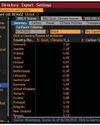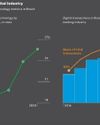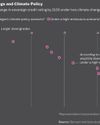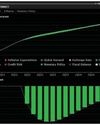LUIS CAPUTO IS GETTING frustrated with the bond market.

He’s guarded about it—he has to be. After all, he’s the finance minister of Argentina, the biggest bond issuer in the developing world, which means he’s constantly hitting up investors for cash. But the tension comes out deep into an hour long interview in his Buenos Aires office. Why is it, the former Wall Street banker wants to know, that the investing community doesn’t appreciate all that the country has achieved?
Eighteen months have passed since Argentina shed its status as an international pariah mired in bond default litigation. There was the elimination of currency controls, the stabilization of the peso, the revival of the mortgage market, the reduction of the budget deficit. Sure, investors have given some measure of respect to the government—after all, they were willing to fork over $2.75 billion in a sale of 100-year bonds with a 7.1 percent coupon in June—but the yields they demand remain high, the credit rating is low, and the country’s stock market is still in the same class as far-flung places such as Mauritius, Tunisia, and Bangladesh.
“I don’t understand why people aren’t more conscious of the big change that’s going on here,” Caputo, 52, says. And then he flashes a bit of that swagger that Argentines are so well-known for throughout South America. “I’m convinced Argentina will be the star of emerging markets for the next 20 years,” he says. “I don’t mean to be cocky, but it’s very evident.”
Diese Geschichte stammt aus der October/November 2017-Ausgabe von Bloomberg Markets.
Starten Sie Ihre 7-tägige kostenlose Testversion von Magzter GOLD, um auf Tausende kuratierte Premium-Storys sowie über 8.000 Zeitschriften und Zeitungen zuzugreifen.
Bereits Abonnent ? Anmelden
Diese Geschichte stammt aus der October/November 2017-Ausgabe von Bloomberg Markets.
Starten Sie Ihre 7-tägige kostenlose Testversion von Magzter GOLD, um auf Tausende kuratierte Premium-Storys sowie über 8.000 Zeitschriften und Zeitungen zuzugreifen.
Bereits Abonnent? Anmelden

See Which Countries Are Falling Behind On Climate Change
Under the Paris Agreement, 190 countries and the European Union pledged to take steps to hold the global temperature rise to less than 2C (3.6F) from preindustrial levels—and preferably 1.5C.

Billionaires Vie for the Future of Brazilian Finance
An escalating battle between two billionaires is upending the financial community in São Paulo, Latin America’s wealthiest city.

Ford Foundation's Darren Walker: ‘We Have to Get Uncomfortable'
DARREN WALKER, 62, disrupted his Wall Street life more than 25 years ago when he left what is now UBS Group AG to volunteer at a school and eventually pursue a career in community development and philanthropy. Since 2013 he’s been at the pinnacle of the philanthropic world as president of the Ford Foundation, created by the family of automaker Henry Ford during the Great Depression to advance human welfare.

Fueling the Ener Transition
I MAY BE BIASED, but some of the most important research and data on the Bloomberg terminal lies in one of its lesser-known functions: {BNEF }

Dig Into Analysts' Estimates for Disruptive Companies
THE PANDEMIC ERA generated a whole wave of disruptive companies as it accelerated the introduction of new products and services in areas including artificial intelligence, digitization, electronic payments, online meeting platforms, and virtual currencies.

Climate Risks Come for Sovereign Credit
FOR YEARS climate scientists have warned about the ferocious wildfires and hurricanes that are now overwhelming many communities. Today alarms are ringing about a related financial danger: risks lurking within government bonds, the biggest part of the global debt market.

Responsible-Investing Pioneer Lydenberg Says ESG Needs An Upgrade
STEVE LYDENBERG’S passion for social change was inspired by anti-Vietnam War demonstrations, consumer boycotts, and the movement to divest from apartheid South Africa. But he didn’t take to the streets. Instead, Lydenberg turned to the world of finance to help catalyze societal change.

Engine No. 1's Grancio: ‘People Will Appreciate an Economic Argument'
ENGINE NO. 1 sent shock waves across corporate America in May when the fledgling investment firm won a boardroom battle with Exxon Mobil Corp., securing three seats on the oil and gas giant’s board after purchasing only about $40 million of its stock.

Find Out Which Companies May Ramp Up Payouts After Covid
AS THE PANDEMIC DISRUPTED business last year, many companies cut or suspended dividends. Which will boost their payouts when economies pick up again?

Get Into the Minds of Central Bankers as They Navigate Shocks
HAVE YOU EVER WONDERED how central bankers forecast the impact of shocks on the economy?